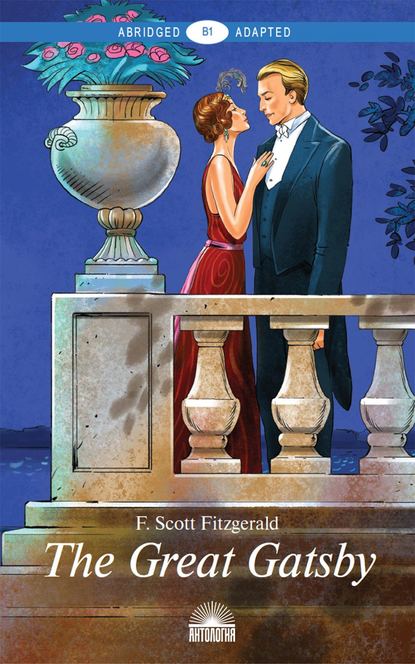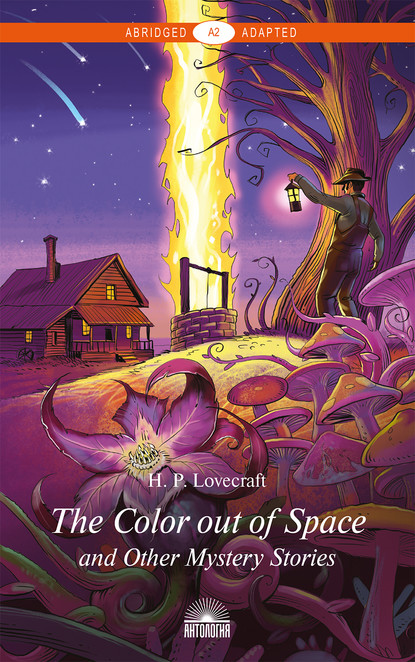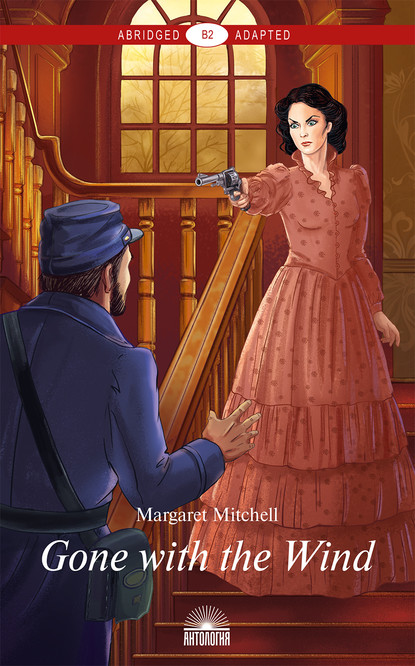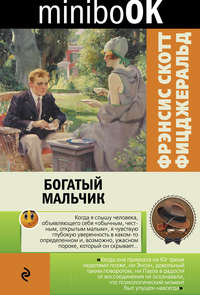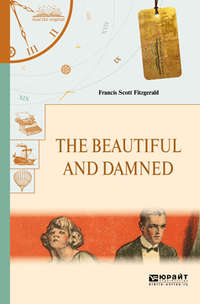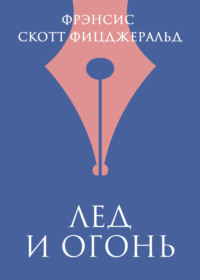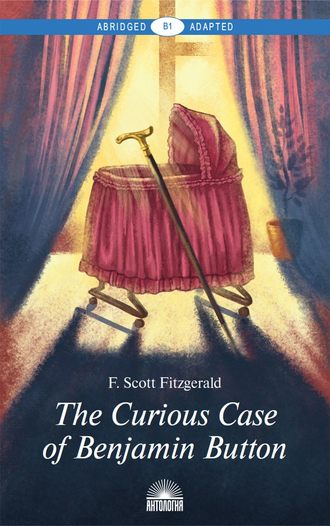
Полная версия
The Curious Case of Benjamin Button and Selected Tales of the Jazz Age Сollection. Адаптированная книга для чтения на английском языке. Уровень B1
But when his own time came, and he moved with her in a dance to the music of the latest waltz from Paris, his jealousy and worry melted from him like snow. Blind with delight, he felt that life was just beginning.
«You and your brother got here just as we did, didn't you?» asked Hildegarde, looking up at him with eyes that were like bright blue enamel.
Benjamin hesitated. If she took him for his father's brother, would it be best to tell her the truth? He remembered his experience at Yale, so he decided against it. It would be rude to argue with a lady; it would be criminal to ruin this wonderful moment with the grotesque story of his birth. Later, perhaps. So he nodded, smiled, listened, was happy.
«I like men of your age», Hildegarde told him. «Young boys are so idiotic. They tell me how much champagne they drink at college, and how much money they lose playing cards. Men of your age know how to understand women».
Benjamin felt he was about to propose to her immediately – with an effort he resisted the desire.
«You're just the romantic age», she continued. «Fifty. Twenty-five pretends to be wise and experienced; thirty is pale from overwork; forty is the age of long and dull stories; sixty is – oh, sixty is too near seventy; but fifty is the proper age. I love fifty».
Fifty seemed to Benjamin a wonderful age. He wished passionately to be fifty.
«I've always said», went on Hildegarde, «that I'd rather marry[28] a man of fifty who would take care of me than marry a man of thirty and take care of him».
For Benjamin the rest of the evening was in a honey-colored dream. Hildegarde gave him two more dances, and they discovered that they had the same attitudes to all the questions of the day. She agreed to go driving with him on the following Sunday, and then they would discuss all these questions further.
On his way home in the carriage just before the dawn, Benjamin suddenly heard that his father was discussing wholesale hardware.
«… And what do you think should draw our biggest attention after hammers and nails?» the elder Button was saying.
«Love», replied Benjamin absent-mindedly.
«Lugs?» exclaimed Roger Button, «Why, I've just covered the question of lugs».
Benjamin looked at him with astonished eyes just as sunlight burst into the eastern sky suddenly, and a bird sang loudly in the tree…
Chapter 6
When, six months later, the engagement of Miss Hildegarde Moncrief to Mr. Benjamin Button was made known (I say «made known», because General Moncrief declared that he would rather fall upon his sword than[29] announce it), the fever of excitement in Baltimore society reached its peak. The almost forgotten story of Benjamin's birth was remembered and spread out upon the winds of scandal in incredible forms as an adventure novel. It was said that Benjamin was really the father of Roger Button; that he was his brother who had spent forty years in prison; that he was John Wilkes Booth[30] in disguise – and, finally, that he had two small conical horns hidden on his head.
The Sunday New York newspapers presented the case with fascinating pictures which showed the head of Benjamin Button attached to a fish, or to a snake. He became known, among journalists, as the Mystery Man of Maryland. But the true story, as it usually happens, was known only to a few people.
However, every one agreed with General Moncrief that it was «criminal» for a lovely girl who could marry any handsome young man in Baltimore to throw herself into the arms of a man who was surely fifty. Mr. Roger Button published his son's birth certificate in large type in the Baltimore city newspaper but in vain[31]. No one believed it. You had only to look at Benjamin and see.
The two people, who were most concerned parties[32], had no hesitations. So many of the stories about her bridegroom were false that Hildegarde refused stubbornly to believe even the true one. In vain General Moncrief pointed out to her the high risk of deaths among men of fifty – or, at least, among men who looked fifty; in vain he told her of the instability of the wholesale hardware business. Hildegarde had chosen to marry a middle-aged gentleman, and she married…
Chapter 7
In one thing, at least, the friends of Hildegarde Moncrief were mistaken. The wholesale hardware business was extremely successful. In the fifteen years between Benjamin Button's marriage in 1880 and his father's retirement in 1895, the family capital was doubled – and this was due largely to the younger member of the firm.
Of course, Baltimore accepted the couple in the end. Even old General Moncrief made peace[33] with his son-in-law when Benjamin gave him the money to publish his History of the Civil War in twenty volumes, after nine famous publishers had refused to take it.
There were many changes in Benjamin himself during these fifteen years. It seemed to him that the blood flowed with new energy through his body. It began to be a pleasure to get up in the morning, to walk with an active step along the busy, sunny street, to work long hours with his shipments of hammers and his cargoes of nails. In 1890 he produced his famous business revolution which led to a surprising success: he made the suggestion that all nails used in nailing up the boxes in which nails are shipped are the property of the company-receiver of cargo. The suggestion was approved by Chief Justice[34], became a law, and saved Roger Button and Company, Wholesale Hardware, more than six hundred nails every year.
In addition, Benjamin discovered that he was becoming more and more attracted by the active side of life. He felt his growing enthusiasm for pleasure – he was the first man in the city of Baltimore who bought and drove an automobile. The citizens about the same age, when they met him on the street, were looking with jealous eyes at the picture he made of health and energy.
«He seems to grow younger every year», they remarked. And old Roger Button, now sixty-five years old, who had failed at first to give a proper welcome to his son, was trying to compensate for his mistake at last by looking at Benjamin with admiration.
And here we come to an unpleasant matter which should be passed over as quickly as possible. There was only one thing that worried Benjamin Button; his wife didn't attract him any longer.
At that time Hildegarde was a woman of thirty-five, with a son, Roscoe, fourteen years old. In the early days of their marriage Benjamin had loved and admired her very much. But, as the years passed, her honey-colored hair became dull brown, the blue enamel of her eyes turned into a cheap dirty dishes – moreover, and, most of all, she had become too set in her ways[35], too calm, too satisfied, too lifeless in her excitements, and too rational in her taste. As a bride she had «pulled» Benjamin to dances and dinners – now the things changed. She went out socially with him, but without enthusiasm, driven by that habit of inertia which comes to each of us one day and stays with us to the end.
Benjamin's disappointment grew stronger. At the start of the Spanish-American War in 1898[36] his home had so little charm for him that he decided to join the army. With his business influence he got an officer position as captain, and showed such talents at the work that he was made a major, and finally a lieutenant-colonel just in time to participate in the celebrated attack up San Juan Hill.[37] He was slightly wounded, and received a medal.
Benjamin had loved the active and exciting army life so much that he regretted to give it up, but his business needed attention, so he resigned his officer position and came home. He was met at the station by an orchestra and escorted to his house.
Chapter 8
Hildegarde, waving a large silk flag, greeted him on the front steps, and as he kissed her he felt in despair that these three years had taken her beauty and youth. She was a woman of forty now, with a faint line of gray hairs in her head. The sight depressed him.
Up in his room he saw his reflection in the familiar mirror – he went closer and examined his own face with worry, comparing it after a moment with a photograph of himself in uniform taken just before the war.
«Good Lord!»[38] he said aloud. The process was continuing. There was no doubt of it – he looked now like a man of thirty. He was not delighted, he was uneasy – he was growing younger. He had hoped until that moment that when he reached a physical age equal to his age in years, the grotesque phenomenon which had marked his birth would stop. He trembled. His future seemed to him awful, incredible.
When he came downstairs Hildegarde was waiting for him. She seemed irritated, and he wondered if she had at last discovered that there was something wrong with him. He made an effort to break the uneasiness between them when he mentioned the matter at dinner in what he considered a tactful way.
«Well», he remarked, «everybody says I look younger than ever».
Hildegarde looked at him scornfully and grumbled, «Do you think it's anything to boast about?»
«I'm not boasting», he said uncomfortably.
«I think you have enough dignity to stop it», she said after a moment.
«How can I?» he demanded.
«I'm not going to argue with you», she answered angrily. «But there's a right way of doing things and a wrong way. If you've made up your mind[39] to be different from everybody else, I don't suppose I can stop you, but I really don't think it's very tactful».
«But, Hildegarde, I can't help it[40]».
«Yes, you can. You're simply stubborn. You think you don't want to be like anyone else. You always have been that way, and you always will be. But just think how it would be if every one else looked at things as you do – what would the world be like?»
Benjamin thought there was no answer to that stupid argument and didn't say anything, and from that moment a misunderstanding between them began to grow. He wondered what possible charm she had ever had over him.
In addition to the breakup, he found, as the new century started, that his desire for amusements grew stronger. He was at every party of the city of Baltimore, danced with the prettiest of the young married women, chatted with the most popular of the debutantes[41], and found their company charming, while his wife sat among other older women who came to watch their children, and now followed him in disapproval with jealous, puzzled, and scornful eyes.
«Look!» people remarked. «What a pity! A young fellow that age married to a woman of forty-five. He must be twenty years younger than his wife». They had forgotten – as people often forget – that back in 1880 their mothers and fathers had also remarked about this same strange couple.
Benjamin's growing unhappiness at home was compensated for by his many new interests. He started playing golf and made a great success of it. He started to enjoy dancing: in 1906 he was an expert at «The Boston», in 1908 he was the best at the «Maxixe», and in 1909 every young man in town was jealous of his «Castle Walk».[42]
His social life, of course, influenced his business partly, but he felt that after twenty-five years of hard work at wholesale hardware, he could soon hand it over to his son, Roscoe, who had recently graduated from Harvard.
He and his son were, in fact, often mistaken for each other. This pleased Benjamin – he soon forgot the secret fear which had come over him on his return from the Spanish-American War, and now took a natural pleasure in his appearance. There was only one fly in the ointment[43] – he hated to appear in public with his wife. Hildegarde was almost fifty, and the sight of her made him feel absurd…
Chapter 9
One September day (a few years after Benjamin had handed Roger Button & Co., Wholesale Hardware, over to young Roscoe Button) a young man, about twenty years old, entered Harvard University in Cambridge as a freshman. He did not make the mistake of announcing that he was over fifty, he also didn't mention the fact that his son had graduated from the same institution ten years before.
He almost immediately got a leading position in the class, partly because he seemed a little older than the other freshmen, whose age was about eighteen.
But his real success was due to the fact that in the football game with Yale he played so well, with so much energy and with such a cold anger that he scored seven touchdowns[44] and fourteen field goals for Harvard, and as a result eleven of Yale men were carried one by one from the field in despair. He became the most celebrated man in college.
Strangely enough[45], in his third year he was hardly able to play football. Everybody noticed that he had become much thinner and was not quite as tall as before. He made no touchdowns – indeed, the team kept him only in hope that his enormous reputation would bring terror to the Yale team.
In his senior year he left the team. He had become so thin and weak that one day he was taken by some second year students for a freshman, an incident which humiliated him terribly. He became known as something of a prodigy – a senior who was surely no more than sixteen – and he was often shocked at the life experience of some of his classmates. His studies seemed harder to him – he felt that they were too difficult. He had heard his classmates speak of St. Midas's, the famous prep school, at which so many of them had prepared for college, and he made up his mind to enter St. Midas's after his graduation, where the life among boys his own size would be more natural and comfortable to him.
Upon his graduation in 1914 he went home to Baltimore with his Harvard diploma in his pocket. Hildegarde moved to Italy, so Benjamin went to stay with his son, Roscoe. But though he was welcomed there, Roscoe obviously had no warm feeling toward him – his son seemed irritated to see Benjamin, who was walking about the house in his sad youthful dreams. Roscoe was married now and had a good position in Baltimore life, and he wanted no scandal in connection with his family.
Benjamin was no longer persona grata[46] with the debutantes and younger college men, he found himself alone, only three or four fifteen-year-old neighbor boys were his companions. His idea of going to St. Midas's school came back to him.
«Listen», he said to Roscoe one day, «I've told you over and over that I want to go to prep school».
«Well, go, then», answered Roscoe coldly. The matter was unpleasant to him, and he wished to avoid a discussion.
«I can't go alone», said Benjamin helplessly. «You'll have to take me up there».
«I have no time», declared Roscoe suddenly. He looked uneasily at his father. «As a matter of fact», he added, «you'd better stop[47]. You'd better not go on with this business any longer. You'd better – better», he paused and his face turned red as he was trying to find words – «you'd better turn around and start back the other way. This has gone too far to be a joke. It isn't funny any longer. You – you behave yourself!»
Benjamin looked at him, close to tears.
«And another thing», continued Roscoe, «when visitors are in the house I want you to call me „Uncle“ – not „Roscoe,“
but „Uncle,“ do you understand? It looks absurd for a boy of fifteen to call me by my first name. Perhaps you'd better call me „Uncle“ all the time, so you'll get used to it[48]».
With an angry look at his father, Roscoe turned away…
Chapter 10
After this conversation Benjamin felt depressed, he walked upstairs and stared at himself in the mirror. He had not shaved for three months, but there was nothing on his face to shave. When he had first come home from Harvard, Roscoe had suggested that he should wear spectacles and false whiskers on his cheeks, and it had seemed for a moment that the grotesque comedy of his early years started to repeat. But whiskers made him feel both discomfort and shame. He burst into tears and Roscoe had to give it up.
Benjamin opened a book of boys' stories, The Boy Scouts in Bimini Bay, and began to read. But he found himself thinking about the war. America hadjoined the Allied forces,[49] and Benjamin wanted to join the army too, but, alas, sixteen was the minimum age, and he looked much younger. His true age, which was fifty-seven, was too old for the army.
There was a knock at his door, and the man handed him an official letter addressed to Mr. Benjamin Button. Benjamin opened it, and read the text with delight. It informed him that many reserve officers who had served in the Spanish- American War were called back into service with a higher position, so he got his position as brigadier-general in the United States army with orders to report immediately.
Benjamin jumped to his feet trembling with enthusiasm. This was what he had wanted. Ten minutes later he entered a large tailor's shop on Charles Street, and asked in his high boy's voice to be measured for a uniform.
«Want to play soldier, sonny?» demanded a clerk casually.
Benjamin was furious. «Look here! Never mind what I want!» he protested angrily. «My name's Button and I live on Mt. Vernon Place, so you know I'm good for it[50]».
«Well», admitted the clerk with hesitation, «if you're not, I guess your daddy is, all right».
Benjamin was measured, and a week later his uniform was ready. He had difficulty in getting the proper general's insignia because the dealer insisted that a nice badge would look just as well[51] and be much more fun to play with.
Saying nothing to Roscoe, he left the house one night and went by train to military camp, in South Carolina, where he was going to command a military brigade. On a hot April day he approached the entrance to the camp, paid the taxi driver who had brought him from the station, and turned to the guard.
«Get some one to carry my luggage!» he commanded.
The soldier looked at him with disbelief. «Say», he remarked, «where are you going with the general's stuff, sonny?»
Benjamin, veteran of the Spanish-American War, moved upon him with fire in his eye, but with, alas, a breaking boy's voice.
«Stand to attention!»[52] he commanded loudly; he paused to take breath – then suddenly he saw that the soldier stood straight and brought his rifle to the present[53]. Benjamin hid a smile of satisfaction, but when he glanced around his smile faded. He saw an impressive colonel who was approaching on horseback.
«Colonel!» called Benjamin sharply.
The colonel came up and looked down at him. «Whose little boy are you?» he demanded kindly.
«I'll soon show you whose little boy I am!» protested Benjamin in an angry voice. «Get down off that horse!»
The colonel burst into laughter.
«You want my horse, eh, general?»
«Here!» cried Benjamin in despair. «Read this». And he gave his official letter to the colonel. The colonel read it, he was astonished.
«Where did you get this?» he demanded, putting the document into his own pocket.
«I got it from the Government, as you'll soon find out!»
«You come along with me», said the colonel with a strange look. «We'll go up to headquarters commander and talk this over. Come along».
The colonel turned and began moving in the direction of headquarters. There was nothing for Benjamin to do but follow him – he tried to keep as much dignity as possible and promised himself to take revenge. But this revenge did not materialize. Two days later, however, his son Roscoe materialized from Baltimore, irritated and angry at a quick trip, and escorted the general in tears, without uniform, back to his home.
Chapter 11
In 1920 Roscoe Button's first child was born. While the family celebrated the event, however, no one thought they needed to mention, that the little boy, about ten years old who played around the house with lead soldiers, was the new baby's own grandfather.
No one disliked the little boy whose fresh, cheerful face seemed a little bit sad, but to Roscoe Button his presence was unpleasant and made him suffer. His generation did not consider such a state of things[54] «rational». It seemed to him that his father, in refusing to look sixty, did not behave like a true man of business or a «red-blooded he-man»[55] – these were Roscoe's usual words. Roscoe believed that a man of business should look young, but his father's desire to keep to it in such a curious and wrong manner was irrational. Roscoe was sure of it.
Five years later Roscoe's little boy grew old enough to play childish games with little Benjamin under the control of the same nurse. Roscoe took them both to kindergarten on the same day, and Benjamin found that playing with colored paper and making colored beautiful maps was the most fascinating game in the world. Once when he behaved badly and had to stand in the corner, he burst into tears – but for the most part these were happy hours in the cheerful room, when the sunlight was coming in the windows and he enjoyed feeling his teacher's kind hand on his head.
Roscoe's son went to school after a year, but Benjamin stayed on in the kindergarten. He was very happy. Sometimes when other children talked about what they would do when they grew up, a sad expression appeared on his little face as if he understood that those things would never happen to him.
The days passed on in a usual way. He went back a third year to the kindergarten, but he was too little now to understand what the bright colored papers were for. He cried because the other boys were bigger than he, and he was afraid of them. The teacher talked to him, but though he tried to understand he could not understand at all.
He was taken from the kindergarten. His nurse, Nana became the centre of his small world. On bright days they walked in the park; Nana pointed at a large gray monster and said «elephant», and Benjamin repeated it after her, and when he was going to bed that night he repeated it over and over again to her: «Elyphant, elyphant, elyphant». Sometimes Nana let him jump on the bed, and that was fun, because he enjoyed jumping.
He loved to take a big cane and go around the house, hitting chairs and tables with it and saying: «Fight, fight, fight». When there were people in the house the old ladies tried to speak childish language with him, which interested him, and the young ladies tried to kiss him, which he accepted with calm boredom. And when the long day was over at five o'clock Nana took him upstairs and gave him his evening foods with a spoon.
There were no old memories in his childish sleep; he didn't remember his brave days at college or the bright years when he broke the hearts of many girls. There were only the white, safe walls of his crib and Nana and a man who came to see him sometimes, and a great big orange ball that Nana pointed at and called «sun». When the sun went his eyes were sleepy – there were no dreams, no dreams to worry him.
The past – the wild fight when he led his soldiers up San Juan Hill; the first years of his marriage when he worked hard for young Hildegarde whom he loved; the days before that when he sat smoking with his grandfather in the dark old Button house – all these memories faded like dreams from his mind as if they had never been. He did not remember.
He did not remember clearly whether the milk was warm or cool at his last feeding or how the days passed – there was only his crib and Nana's familiar presence. And then he remembered nothing. When he was hungry he cried – that was all. Through the days and nights he breathed and there were soft sounds over him that he hardly heard. He felt only faint smells, and light and darkness.
Then it was all dark, and his white crib and the dim faces that moved above him, and the warm sweet smell of the milk faded away from his mind.
May Day
I
The war had been fought and won and the great city of the winners was celebrating the victory. All through the long spring days the returning soldiers marched up the highway to the loud sounds of the drums and happy sounds of the military orchestras. The great city had never seen such greatness and shine, because the returning young men were straight and brave, and the young women of the land were naive and pretty both of face and of figure.
There were many adventures that happened in the great city during this time, and several of them – or perhaps one – are presented here.




